 Petzlover
Petzlover Cao da Serra de Aires is originated from Portugal but Pyrenean Mastiff is originated from Spain. Cao da Serra de Aires may grow 27 cm / 10 inches shorter than Pyrenean Mastiff. Cao da Serra de Aires may weigh 73 kg / 160 pounds lesser than Pyrenean Mastiff. Both Cao da Serra de Aires and Pyrenean Mastiff has same life span. Cao da Serra de Aires may have less litter size than Pyrenean Mastiff. Cao da Serra de Aires requires Moderate Maintenance. But Pyrenean Mastiff requires Low Maintenance
Cao da Serra de Aires is originated from Portugal but Pyrenean Mastiff is originated from Spain. Cao da Serra de Aires may grow 27 cm / 10 inches shorter than Pyrenean Mastiff. Cao da Serra de Aires may weigh 73 kg / 160 pounds lesser than Pyrenean Mastiff. Both Cao da Serra de Aires and Pyrenean Mastiff has same life span. Cao da Serra de Aires may have less litter size than Pyrenean Mastiff. Cao da Serra de Aires requires Moderate Maintenance. But Pyrenean Mastiff requires Low Maintenance
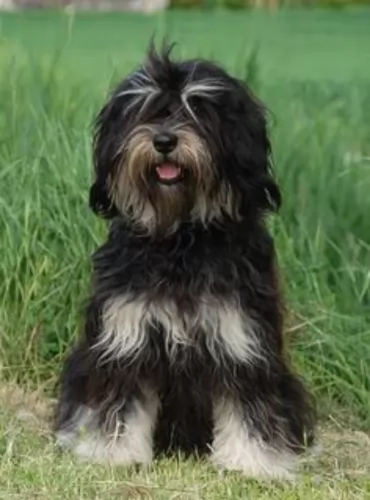 Ancestors of the Cao da Sera de Aires were used for herding livestock in the Serra de Aires and Alentejo, Portugal. This herding dog is native to Portugal and throughout the 20th Century he was kept as a working dog.
Ancestors of the Cao da Sera de Aires were used for herding livestock in the Serra de Aires and Alentejo, Portugal. This herding dog is native to Portugal and throughout the 20th Century he was kept as a working dog.
Known also as the Portuguese Sheepdog, Portuguese Shepherd Dog or Serra de Aires Mountain Dog, there are some questions surrounding the breed's ancestry as there are few records of dogs before 1900. The dog is thought to be related to the Pyrenean and Catalan Sheepdogs and that it has descended from Briards which were imported into Portugal and crossed with the Pyrenean Sheepdog.
The Cão da Serra de Aires breed standard was accepted by the Portuguese Kennel Club, and the breed was recognized internationally in 1996. The dog was also recognized by the United Kennel Club in the Herding Group in 2006.
 The Pyrenean Mastiff originates from Spain, descending from ancient livestock guardian-type dogs.
The Pyrenean Mastiff originates from Spain, descending from ancient livestock guardian-type dogs.
They have always been used as guardians, looking out for livestock and warding off predators.
When you do research you find that there is little information on the exact origins of the dog. It was only in recent years that the dog was taken out of its native region and sent to the USA, but it isn’t recognized by the AKC.
The dog was however recognized by the FCI in 1982.
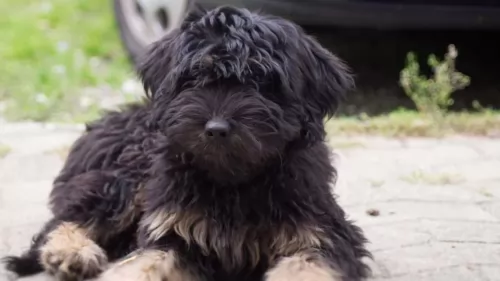 The beautiful Cão da Serra de Aires is a medium-sized dog. He stands at 45 to 55 cm at the withers and weighs about 17 to 27 kg. He is recognizable by the long, shaggy, single-layer coat, of straight or slightly wavy hair. Don’t be deceived by the coat as below, the dog has a muscular, athletic body.
The beautiful Cão da Serra de Aires is a medium-sized dog. He stands at 45 to 55 cm at the withers and weighs about 17 to 27 kg. He is recognizable by the long, shaggy, single-layer coat, of straight or slightly wavy hair. Don’t be deceived by the coat as below, the dog has a muscular, athletic body.
The coat comes in different shades such as fawn, gray, yellow and black. The dog has a long tail which is held straight out or down and he has medium-length, floppy ears. You’ve got to look hard, as the facial features of the dog are hidden by its shaggy coat. He has a lot of facial hair that sometimes you have to wonder if he can see out of his eyes.
The Cao da Serra de Aires is a wonderful canine companion and is devoted and loyal, forming strong bonds with their human family. He is a playful, amicable dog and gets on well with children in the home as well as with other pets.
He is intelligent and trainable, and when properly trained and socialized,he becomes an even nicer pet to have around and is obedient to his master’s voice. He is territorial, strong willed and dominant and makes a good watchdog too.
 This is a beautiful big dog, strong and muscular. He stands at between 75 and 82cm in height and weighs between 70 and 100kg, males and females.
This is a beautiful big dog, strong and muscular. He stands at between 75 and 82cm in height and weighs between 70 and 100kg, males and females.
He has a thick double coat which is fairly long and which also sheds regularly. The coat is essentially white in color with large markings of reddish brown, tan, grey or black.
The Pyrenean Mastiff has a large head with a black nose, small, dark eyes, floppy, medium sized ears and a long tail with lush hair growth.
Large he may be, but the Pyrenean Mastiff is a docile dog that gets on well with children as well as with other pets. He is intelligent but also strong willed and independent, making him a little bit difficult to handle if he chooses to ignore your commands.
Training and socialization will be required if you want him to be obedient and well mannered. He can do well with you as a novice pet owner, so long as you are firm, consistent, kind, patient and fair in your handling of the Pyrenean Mastiff.
Even with socialization, he tends to be wary around strangers and becomes quite protective around his human family.
He is a calm dog that doesn’t require a whole lot of exercise, but he isn’t suited to life on a small property in the city as he needs a lot of space to feel content and at ease.
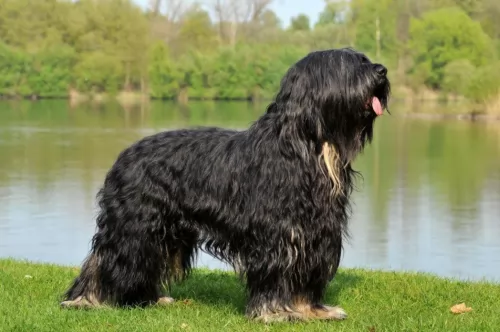 The Cão da Serra de Aires is such a loyal dog to his human family that he makes a splendid pet. He is active, having worked historically at herding and guarding.
The Cão da Serra de Aires is such a loyal dog to his human family that he makes a splendid pet. He is active, having worked historically at herding and guarding.
Socialization and obedience training ensure that he becomes an exceptional pet and he has a host of positive attributes to his name – he is intelligent, energetic, loyal and loving. He may have been used long ago to guard livestock, but today he is selected as a pet specifically for his excellent companionship and for his protective nature.
 These beautiful dogs have always been extraordinary guarding dogs, but he has some other excellent characteristics that make him such a great companion.
These beautiful dogs have always been extraordinary guarding dogs, but he has some other excellent characteristics that make him such a great companion.
He is a loyal, loving dog and easy to train.
You just have to think twice before you take such a large dog into your home, as he doesn’t like to be cooped up in small spaces. He will also eat a lot too.
You want to know that you can provide the Pyrenean Mastiff with all these things. If you have the means to keep such a large pet, then he will make you a splendid canine companion.
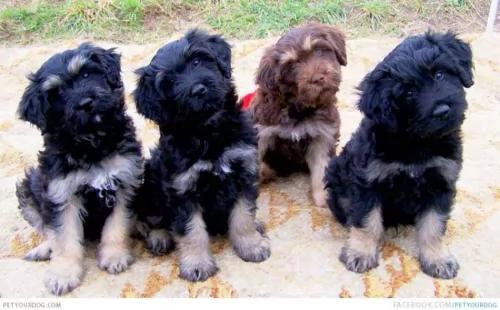 As with most dogs that are looked after well, their health can be good. The Cao da Serra de Aires isn’t likely to keep you at the vet often. Just like with any good dog, there are some health disorders that can benefit you to know about.
As with most dogs that are looked after well, their health can be good. The Cao da Serra de Aires isn’t likely to keep you at the vet often. Just like with any good dog, there are some health disorders that can benefit you to know about.
Being forewarned , you can get your pet to the vet quickly before the illness gets out of hand.
There are some pet owners who want to have their pets tested by the Orthopedic Foundation for Animals as well as the Canine Eye Registration Foundation to rule out health defects such as hip dysplasia and cataracts before they manifest themselves in their pets. This is of particular importance to breeders so as to prevent the parent dogs passing bad genetic conditions to the puppies.
This is a common skeletal disease where the dog’s hip joints don’t develop properly. It can be terribly painful for your pet to get around. It’s a genetic condition and while it is more prevalent in big dogs, any breeds are susceptible.
Your dog will battle along with painful joints and sometimes his hind-end will be lame. You’ll notice that once lying down, he battles to get up again. Fortunately vets are well acquainted with this ailment and they have different options to treat and manage it.
Cataracts in your dog come about from a disease process which affects the lens of the eye. The eye loses its transparency and impairs vision. There are some instances where cataracts can cause blindness. You’ll see a whitish gray area in your pets eye. The most common cause of cataracts is genetics. Get your pet to the vet who will do certain tests to evaluate the eyes and make a recommendation.
 This is a fairly healthy dog breed, particularly when you consider what a big dog he is. There are always some health concerns to watch for so that you can take steps to get your pet well again.
This is a fairly healthy dog breed, particularly when you consider what a big dog he is. There are always some health concerns to watch for so that you can take steps to get your pet well again.
There is tartar build-up on the teeth and this can lead to infection of the gums and roots of the teeth. Rotting teeth can cause pain, but more worrisome they can cause damage to the heart and kidneys as well as the dog's joints. The vet or professional pet groomers can keep your pet’s teeth clean. They can advise you on how to take care of your large pet’s teeth.
Diseases such as rabies and parvo can be prevented by means of vaccine.
You can’t afford for a big dog like this to become obese. It’s a serious disease and can put pressure on your dog’s joints and also cause back pain and digestive disorders.
Your dog can be infected with all kinds of worms and bugs such as ticks d and fleas as well as mites. Some of these parasites can be transmitted to you. Your vet can talk about preventive medication.
Gastric Dilatation and Volvulus, commonly referred to as bloat often occurs in dogs with deep chests.
The stomach twists and fills with gas,and blood to the stomach is cut off. Left unattended to, your dog can die, sometimes within half an hour. His stomach is hard and swollen, requiring immediate veterinary attention.
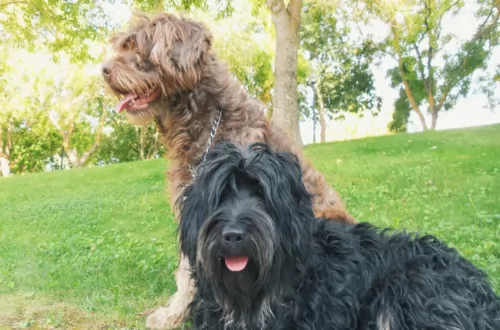 As a working dog used to long hours of action, the Cao da Serra de Aires will need lots of activity. He’ll need you taking him for long walks and playing ball games with him. He can become frustrated and destructive when left without any physical stimulation.
As a working dog used to long hours of action, the Cao da Serra de Aires will need lots of activity. He’ll need you taking him for long walks and playing ball games with him. He can become frustrated and destructive when left without any physical stimulation.
The Cao da Serra de Aires may have long hair but he isn’t high maintenance. He won’t require professional grooming, but will require a good brush a least twice a week. This is because the long coat can tangle.
To keep him looking his best, you’ll want to be trimming the hair around his paws. Another important grooming task is checking his ears and cleaning them. You have to be careful about cleaning your pet ears if you don’t know how, as it could damage the ears. Your vet can always advise you on how this is done.
 Have your pet spayed or neutered if you don’t want puppies. Spaying or neutering also decreases the likelihood of certain types of cancers.
Have your pet spayed or neutered if you don’t want puppies. Spaying or neutering also decreases the likelihood of certain types of cancers.
Nothing but a top quality diet is good enough for your pet. Commercially manufactured dog foods are a convenient means to feed your pet, and there are some excellent brands.
Look out for the ones for extra large dogs and avoid the ones with low quality ingredients. The dry kibble you give your big pet can be made more tasty when you add some homemade food to it about twice a week.
Dogs thrive on simplicity, so boiled chicken, sweet potatoes, brown rice or pasta, carrots and spinach will be wonderful for him when you chop the food up and add it into the dry kibble. Its such a tasty, wholesome treat for your pet.
Some raw meat added in occasionally will contribute to your pet’s heath. Make sure he is never without a constant supply of fresh, cool water.
Brush his coat at least twice a week. Check inside his ears for redness which could indicate an ear infection.
He’s an intelligent pet with lots of energy, so you will need to keep his mind and body active by ensuring he enjoys walks every day. He isn’t a dog that requires running with you on your jogs or cycles.